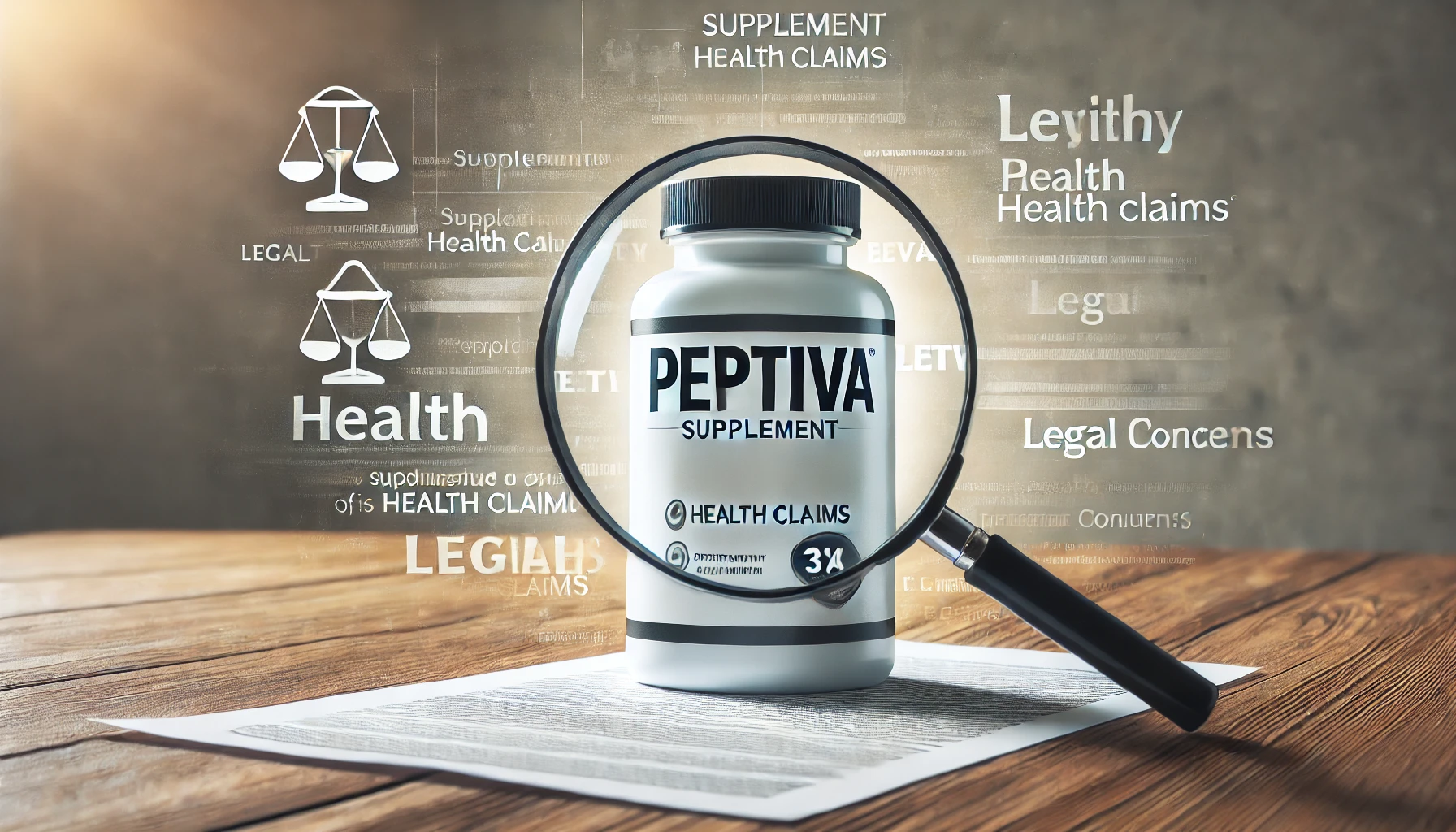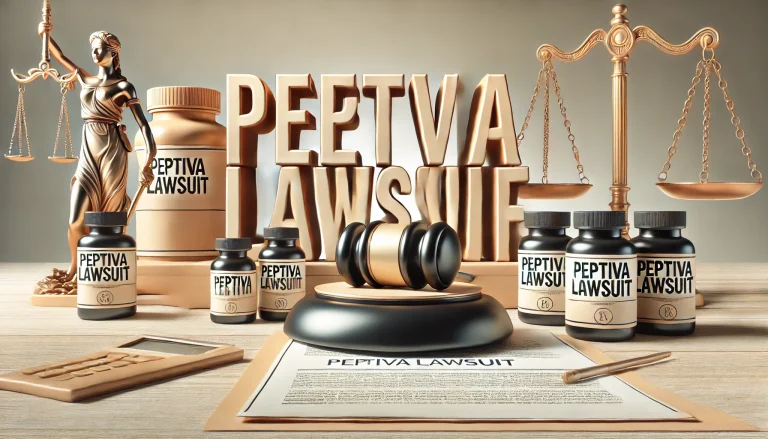The Peptiva lawsuit has captured attention due to its focus on deceptive advertising and unfair business practices. Peptiva, a brand specializing in probiotic and sleep support supplements, is facing legal action from consumers who accuse the company of misleading health claims and using unclear subscription practices. This case has the potential to impact not only Peptiva but also the broader dietary supplement industry, raising important questions about consumer rights, product marketing, and transparency in the supplement market.
Background on Peptiva
Peptiva is a health supplement company known for offering products designed to improve gut health and promote better sleep. Their key products include probiotics that claim to support digestion and various sleep aids marketed as solutions for insomnia and other sleep disorders. The company promotes its products as scientifically-backed, claiming that they can bring significant health benefits, such as improved digestive function and more restful sleep.
However, many of Peptiva’s claims have come under scrutiny. The company’s marketing materials have suggested that its supplements can significantly enhance health without providing sufficient or credible scientific evidence to back these assertions. The lawsuit challenges these claims, alleging that Peptiva misrepresented its products’ benefits to encourage sales, thus violating consumer protection laws.
Peptiva Lawsuit: What You Need to Know About Allegations and Consumer Impact
The Peptiva lawsuit has brought attention to important issues surrounding consumer protection in the dietary supplement industry. Peptiva, a company known for its probiotics and sleep aids, is accused of misleading customers through exaggerated health claims and unclear subscription terms. Consumers allege that the advertised benefits of Peptiva products, such as improved gut health and better sleep, lack sufficient scientific evidence, raising concerns about false advertising.
Additionally, many customers reported being charged $70.63 monthly after signing up for a “free trial.” These charges were often unexpected, as the terms and conditions outlining the subscription were not clearly disclosed. This has led to complaints about deceptive billing practices, with consumers feeling misled and financially burdened.
The lawsuit aims to hold Peptiva accountable for these practices, emphasizing the importance of transparency in advertising and billing. It serves as a reminder for consumers to carefully review product claims and subscription terms before making purchases. The case also highlights the need for stronger regulations to ensure companies prioritize ethical marketing and protect customer rights.
Key Allegations in the Lawsuit
False Advertising Claims
The lawsuit emphasizes that Peptiva’s advertisements exaggerated the potential health benefits of its products. Consumers were led to believe that the probiotics and sleep aids could have dramatic positive effects on their gut health and sleep patterns. However, the lawsuit argues that Peptiva failed to provide reliable scientific evidence to substantiate these bold health claims. This created the impression that the products were more effective than they actually were, causing potential harm to consumers who relied on these promises.
Deceptive Billing Practices
Another critical allegation in the lawsuit relates to Peptiva’s billing practices, specifically those associated with its free trial offer. Many consumers who signed up for a free trial of Peptiva’s products reported being charged unexpected monthly fees of approximately $70.63 once the trial period ended. The lawsuit claims that these charges were not clearly explained upfront, leaving consumers with little opportunity to cancel the subscription before they were billed. As a result, consumers who thought they were only paying for a free trial found themselves locked into expensive, recurring monthly charges.
Impact on Consumers
The Peptiva lawsuit has highlighted several negative consequences for consumers:
Financial Burden
Consumers who unknowingly signed up for recurring charges faced financial stress when they were billed without clear authorization. The unexpected monthly payments created frustration, especially since many were unaware that they had agreed to such terms.
Health and Wellness Concerns
Beyond the financial impact, consumers who purchased Peptiva’s products in hopes of improving their gut health or sleep found themselves disappointed when the products did not live up to their advertised benefits. The lack of proven effectiveness and the failure to deliver on the promised results left many feeling misled and frustrated.
Trust Issues
The case has damaged the trust consumers have in Peptiva. With deceptive practices, such as misleading marketing and unclear billing terms, customers have become wary of the company’s motives, and this lawsuit has cast doubt on the overall integrity of the brand.
Legal and Regulatory Implications
The legal implications of this lawsuit could be far-reaching:
Possible Outcomes for Peptiva
If the court rules in favor of the consumers, Peptiva could face significant consequences, including financial penalties, mandatory refunds to affected customers, and changes to their business practices. The company could be forced to revise its advertising strategies to ensure future promotions are truthful and substantiated by scientific evidence.
Impact on the Dietary Supplement Industry
This lawsuit underscores the need for stricter regulations within the dietary supplement industry. As the industry grows and more consumers turn to supplements for health and wellness, it’s crucial that companies operate transparently and ethically. This case could prompt more rigorous oversight by regulatory bodies, such as the FDA, to ensure that supplement companies are held accountable for false claims and misleading billing practices.
Potential for Legal Precedent
If the lawsuit results in a major legal ruling, it could set a precedent for future cases involving deceptive marketing and billing practices within the supplement industry. It may encourage more consumer protection lawsuits and push for tighter regulations in health-related advertising.
Consumer Awareness and Advice
This lawsuit serves as a valuable lesson for consumers about the importance of being cautious when purchasing products, particularly dietary supplements, online:
Read the Terms and Conditions
Always carefully read the terms and conditions before accepting any free trial offers. Check for any hidden fees or subscription commitments that may follow a “free trial” period. Many companies use fine print to include recurring charges, so it’s important to fully understand what you are agreeing to.
Examine Health Claims
Be skeptical of bold health claims, especially those made by companies that do not provide strong scientific evidence or third-party testing to back up their assertions. Look for products that are supported by credible research and clinical trials, and verify the information through trusted health professionals.
Monitor Billing Statements
Keep an eye on your bank or credit card statements after making any purchase, particularly for trial-based products. If you notice any unexpected charges, contact the company immediately to resolve the issue. Many companies will offer refunds or cancellations if you act quickly.
Know Your Rights
If you believe you have been misled by a company’s marketing or billing practices, don’t hesitate to file a complaint with consumer protection agencies such as the Federal Trade Commission (FTC) or the Better Business Bureau (BBB). These agencies are there to help protect your rights and hold companies accountable for deceptive practices.
Current Status of the Lawsuit
The lawsuit against Peptiva is still ongoing. The legal process is complex, and the final outcome has not yet been determined. The lawsuit is being closely followed by both consumers and industry experts, as its resolution could influence future regulatory measures and consumer protection standards within the supplement market. Although a timeline for resolution is not set, many expect the case to continue for several months as both sides present their evidence.
Conclusion
The Peptiva lawsuit sheds light on critical issues of false advertising and deceptive business practices within the dietary supplement industry. As consumers, it is vital to stay informed and vigilant when making purchasing decisions, especially when it comes to health-related products. This lawsuit serves as a reminder of the need for transparency, scientific backing, and ethical business practices from companies that sell health products.
The ongoing legal battle will likely have a lasting impact on Peptiva and could potentially reshape how the dietary supplement industry operates. If the lawsuit results in a favorable outcome for consumers, it may inspire stronger regulations and more careful scrutiny of marketing and subscription practices across the health and wellness industry.
FAQs
What are the main issues in the Peptiva lawsuit?
The lawsuit focuses on false advertising of product benefits and deceptive billing practices related to unclear subscription terms.
What charges are consumers complaining about?
Many reported unexpected recurring charges of $70.63 monthly after signing up for free trials without clear disclosure.
Are Peptiva’s health claims scientifically backed?
The lawsuit alleges that Peptiva’s claims lack sufficient scientific evidence, making their marketing potentially misleading.
What should consumers do if they feel misled by Peptiva?
Consumers can report their concerns to regulatory bodies like the FTC or seek refunds directly from Peptiva.
How might the lawsuit impact the supplement industry?
It could lead to stricter regulations on health claims and increased scrutiny of subscription-based sales practices.
Article Recommendations
Sheetz Lawsuit Background Checks Debate: Are Blanket Hiring Policies Putting Companies at Risk?
UWM Lawsuit 2024: Why the Mortgage Industry Is Watching These Legal Cases Closely
Sparta Mesothelioma Legal Question: Exploring Compensation, Lawsuits, and Asbestos Trust Funds




